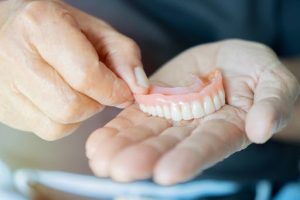Dentures
Dentures in Denver, CO
Restore Your Beautiful Smile With Custom Dentures
 If you’re suffering from tooth loss due to decay, injury, or other reasons, don’t worry! Dentures are a great option to help you eat, speak, and smile with confidence. Dentures consist of artificial teeth and a gum-colored base, and at Lowry Advanced Dentistry our Denver, CO dentist Dr. Michael Hoagburg offers dentures that are available in different types and styles, so you can choose the one that works best for you.
If you’re suffering from tooth loss due to decay, injury, or other reasons, don’t worry! Dentures are a great option to help you eat, speak, and smile with confidence. Dentures consist of artificial teeth and a gum-colored base, and at Lowry Advanced Dentistry our Denver, CO dentist Dr. Michael Hoagburg offers dentures that are available in different types and styles, so you can choose the one that works best for you.
Although it may take some time to get used to wearing them, many people find that the benefits of dentures are worth the initial adjustment period. With dentures, you can improve your oral health, regain your natural-looking smile, and enjoy a better quality of life.
What Are Dentures?
Dentures are a type of dental prosthetic device used to replace missing teeth. They’re removable and custom-made to fit the unique shape and structure of the patient’s mouth. Dentures are typically recommended for individuals who have lost many teeth due to decay, injury, or age-related issues. Traditional dentures are removable appliances with artificial teeth and a gum-colored base, which rely on the gums and jawbone ridge for support.
Types of Dentures: Complete and Partial Dentures
 There are various denture types to accommodate everyone’s dental needs. Types of dentures include:
There are various denture types to accommodate everyone’s dental needs. Types of dentures include:
- Complete Dentures: Also known as full dentures, complete dentures are used when all natural teeth in the upper or lower jaw are missing. They’re custom-made to fit the unique shape and structure of the patient’s mouth.
- Partial Dentures: Partial dentures are used when some natural teeth are still present. They attach to the remaining natural teeth and fill in the gaps where teeth are missing. Removable partial dentures consist of replacement teeth attached to a gum-colored base, held in place by a metal framework that clips onto remaining natural teeth.
- Immediate Dentures: Immediate dentures are made before natural teeth are removed and are designed to be placed immediately after tooth extraction. They can be worn temporarily while the gums and bone heal, and a permanent denture is made.
- Overdentures: Overdentures are used when some natural teeth are still present, but are not strong enough to support a partial denture. The overdenture fits over the remaining natural teeth or dental implants.
- Implant-Supported Dentures: Implant-supported dentures are attached to dental implants surgically placed in the jawbone. This provides a more stable and secure fit for the denture.
- Snap-in Dentures: Snap-in dentures are similar to implant-supported dentures, and attach to mini-implants that are less invasive and less expensive than full dental implants.
- Permanent Dentures: Permanent dentures are non-removable dentures supported by dental implants. Only a dentist can remove these dentures that require thorough daily cleaning.
The Benefits of Dentures
Dentures can provide patients with an array of favorable benefits, such as:
- Improved Appearance
- Enhanced Speech
- Improved Chewing Ability
- Increased Confidence
- Improved Oral Health
- Convenience
- Cost-Effective
- Non-invasive
- Restored Facial Structure
- Durability
- Help maintain the shape of the face
- Prevent the remaining teeth from moving and tilting
Dentures Process
The process of getting dentures typically involves several steps. Patients will start with an initial consultation with their dentist or periodontist. At this appointment, it’ll be determined if dentures are right for you. From there, digital impressions will be taken to create your custom dentures. Due to advancements in denture technology, it’s become a non-invasive process that doesn’t cause discomfort.
You’ll attend fitting appointments until they’re perfect. Your dentist or periodontist will recommend follow-up appointments to ensure your dentures function and fit correctly.
Overall, the denture process typically involves several steps to ensure that the dentures are custom-fit to your mouth and provide optimal comfort and functionality.
Dentures Candidacy and Dental Implants
 Dentures can be an excellent option for individuals missing some or all of their teeth, but not everyone is a good candidate for this type of dental appliance. Several factors can affect a person’s candidacy for dentures, including:
Dentures can be an excellent option for individuals missing some or all of their teeth, but not everyone is a good candidate for this type of dental appliance. Several factors can affect a person’s candidacy for dentures, including:
- Jawbone Density
- Good Oral Health
- Gum disease
- Cost
Maintaining Your Dentures with Denture Adhesive
Proper maintenance of dentures is essential for their longevity and to ensure they continue to function properly. Do the following to ensure your dentures stay in great condition:
- Clean daily
- Handle with care
- Store them properly
- Repair when needed
- Replace due to wear and tear
- Use denture cleaner in combination with a soft brush
Eating With Dentures
Getting used to eating with dentures can take time, but with patience and practice, patients can resume their normal eating habits. When you first wear dentures, follow some guidelines to make the transition smoother. Here are some tips for eating with dentures:
- Start with soft foods: When first getting dentures, it’s best to start with soft foods like eggs, yogurt, and cooked vegetables. This allows the patient to get used to the denture and to avoid any discomfort or irritation.
- Cut food into smaller pieces: Cutting food into smaller pieces can make it easier to chew and prevent the denture from moving around in the mouth. This is especially important for hard foods like meat and raw vegetables.
- Chew slowly and evenly: Chewing slowly and evenly distributes the food and reduces the likelihood of the denture slipping or moving around in the mouth. This can also help with digestion.
- Avoid sticky or hard foods: Sticky or hard foods like gum or candy can damage the denture or cause it to dislodge from the mouth. These foods should be avoided while wearing dentures.
- Use denture adhesive: Denture adhesive can help keep the denture in place and prevent it from moving around in the mouth while eating. Follow the instructions carefully and do not use too much adhesive.
Cost of Dentures
On average, the cost of dentures in the United States can range from a few hundred to several thousand dollars per arch, depending on the type of denture, the material used, and the location of the dental practice. It’s important to note that while dentures can be expensive, they’re often covered, at least in part, by dental insurance. Medicaid and some Medicare programs may also cover some or all of the cost of dentures for eligible patients.
Regain Your Smile and Confidence with Dentures
We understand that each individual’s oral health needs are unique, which is why our approach is centered around you. From assessing your candidacy for dentures to crafting a customized treatment plan, we’re dedicated to providing you with the most comfortable, natural-looking, and functional dentures possible.
Say goodbye to the discomfort of missing teeth and embrace the renewed sense of self-assurance that comes with a well-fitted set of dentures. Our commitment doesn’t end when you receive your dentures – we offer ongoing support, adjustments, and education to ensure your continued comfort and satisfaction. Contact Dr. Hoagburg at 303-333-5148 or fill out our online contact form to schedule a consultation.
More Questions About Dentures?
If you have any questions about dentures or would like to set up a consultation—contact us today.
